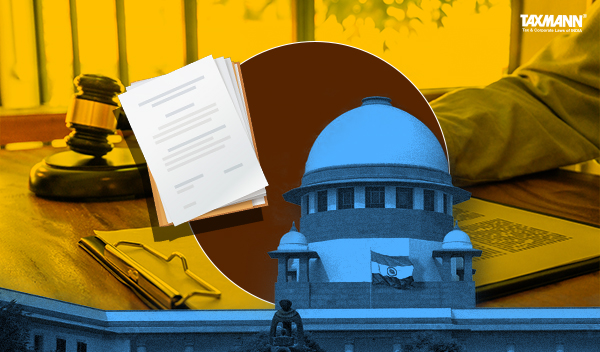Sale Deed Executed by General Power of Attorney Holder After Death of Original Owner Was Invalid | SC
- Blog|News|Income Tax|
- 2 Min Read
- By Taxmann
- |
- Last Updated on 4 March, 2025

Case Details: M. S. Ananthamurthy vs. J. Manjula - [2025] 172 taxmann.com 7 (SC)
Judiciary and Counsel Details
- J.B. Pardiwala & R. Mahadevan, JJ.
Facts of the Case
The suit property was originally part of 1 acre 8 guntas of land in Chunchaghatta Village, Uttarahalli Hobli, Bangalore South Taluk, owned by the original owner, M @ R. He developed the land into individual plots and sold them to various buyers.
The original owner executed a General Power of Attorney (GPA) and an Agreement to Sell in favour of the holder of the GPA. After the owner’s death, the holder, in her capacity as a GPA holder, executed a registered sale deed in favour of her son, appellant No. 2.
The respondents contended that the sale deed was executed after the original owner’s death and was, therefore, invalid. On the other hand, the respondents claimed that after the death of the original owner, his legal heirs sold the suit property to a person through a registered sale deed.
Later, the person sold the property to another person via another registered sale deed. Finally, the person gifted the suit property to her daughter, the answering respondent, through a registered gift deed.
The High Court ruled in favour of the respondents, and the matter reached the Supreme Court.
Supreme Court Held
The Supreme Court held that it is a settled law that a transfer of immovable property by way of sale can only be by a deed of conveyance. An agreement to sell is not a conveyance. It is not a document of title or a deed of transfer of property and does not confer ownership right or title.
Even though the GPA and the agreement to sell were contemporaneous documents executed by the original owner in favour of the same beneficiary, this cannot be the sole factor to conclude that she had an interest in the subject-matter. Even if such an argument were to persuade this Court, the document must have been registered as per section 17(1)(b) of the Registration Act.
In the absence of such registration, it would not be open for the holder of the GPA to contend that she had a valid right, title and interest in the immovable property to execute the registered sale deed in favour of the appellant.
List of Cases Reviewed
- Order passed by High Court of Karnataka at Bengaluru in R.F.A. No. 1318/2014 c/w R.F.A. No. 1317/2014 dated 16-10-2019 [Para 63] – Affirmed
- Suraj Lamp & Industries Pvt. Ltd. v. State of Haryana, reported in (2012) 1 SCC 656 [Para 63] – followed
List of Cases Referred to
- Suraj Lamp & Industries Pvt. Ltd. v. State of Haryana (2012) 1 SCC 656 (para 12)
- Syed Abdul Khader v. Rami Reddy & Ors (1979) 2 SCC 601 (para 28)
- State of Rajasthan v. Basant Nahata (2005) 12 SCC 77 (para 29)
- Timblo Irmaos Ltd., Margo v. Jorge Anibal Matos Sequeira (1977) 3 SCC 474 (para 44)
- Shyam Narayan Prasad v. Krishna Prasad & Ors (2018) 7 SCC 646 (para 52)
- Sajjadanashin Sayed MD. B.E. EDR. (Dead) by LRS. v. Musa Dadabhai Ummer (2000) 3 SCC 350 (para 60)
- In Anathula Sudhakar v. P. Buchi Reddy (Dead) by LRs. (2008) 4 SCC 594 (para 61).
Disclaimer: The content/information published on the website is only for general information of the user and shall not be construed as legal advice. While the Taxmann has exercised reasonable efforts to ensure the veracity of information/content published, Taxmann shall be under no liability in any manner whatsoever for incorrect information, if any.

Taxmann Publications has a dedicated in-house Research & Editorial Team. This team consists of a team of Chartered Accountants, Company Secretaries, and Lawyers. This team works under the guidance and supervision of editor-in-chief Mr Rakesh Bhargava.
The Research and Editorial Team is responsible for developing reliable and accurate content for the readers. The team follows the six-sigma approach to achieve the benchmark of zero error in its publications and research platforms. The team ensures that the following publication guidelines are thoroughly followed while developing the content:
- The statutory material is obtained only from the authorized and reliable sources
- All the latest developments in the judicial and legislative fields are covered
- Prepare the analytical write-ups on current, controversial, and important issues to help the readers to understand the concept and its implications
- Every content published by Taxmann is complete, accurate and lucid
- All evidence-based statements are supported with proper reference to Section, Circular No., Notification No. or citations
- The golden rules of grammar, style and consistency are thoroughly followed
- Font and size that’s easy to read and remain consistent across all imprint and digital publications are applied



 CA | CS | CMA
CA | CS | CMA
